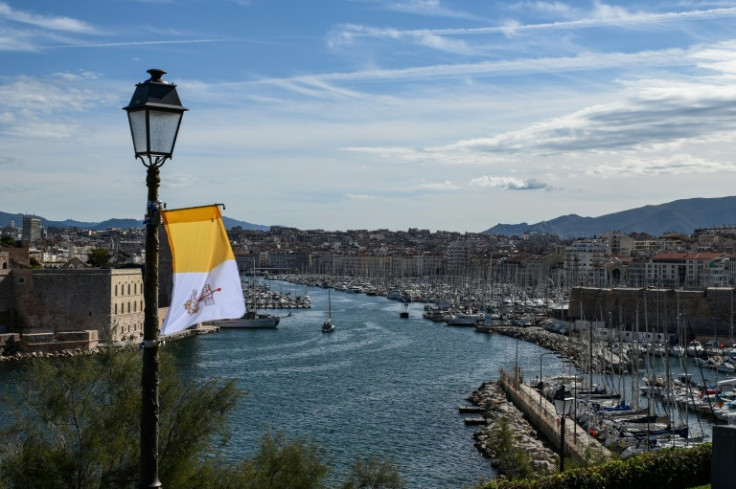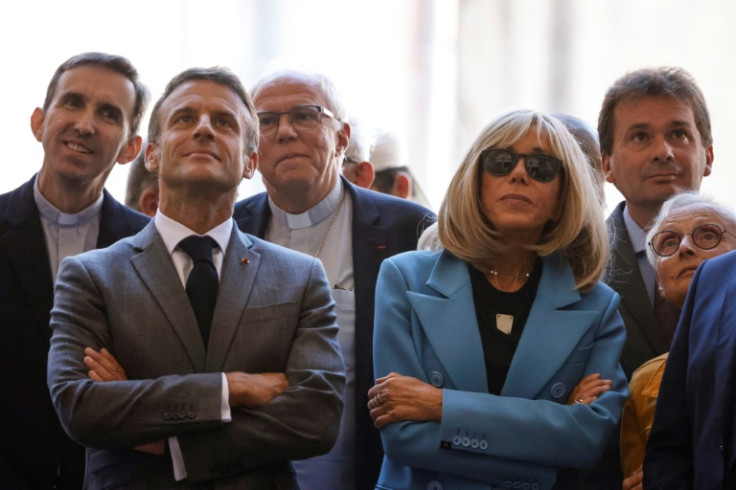France's Catholic Church In Decline As Pope Visits

Tens of thousands of Catholics are expected in the French Mediterranean city of Marseille for Pope Francis's two-day visit, but the once dominant faith is in a long decline in France.
Just 29 percent of French people aged 18-59 said they were Catholic in a 2019-20 survey by statistics authority Insee.
That was a steep plunge from the 85-percent rate in 1962 and France's centuries-old status as "the eldest daughter of the Church".
Even among nominal believers, just eight percent regularly attend mass and only 67 percent of children born to Catholic families stick to the faith.
Illustrating the depth of the decline, just 88 priests are expected to be ordained in France this year.
The Argentina-born Francis, himself from the southern hemisphere, "obviously doesn't think France is a priority," said Bernard Lecomte, a journalist and author of "Tous les Secrets du Vatican" ("All the Vatican's Secrets").
His failure to visit since becoming pope in 2013 has made for "disquiet among French Catholics, who are already quite upset" at becoming "just another minority", Lecomte added.
On the ground, the young are conspicuous by their absence from the pews.
At the Belle-de-Mai church in Marseille, Beninese priest Daniel Barrigah said around 15 teenagers attend mass regularly.
"It's not many, but it's a good start," he said. "We have to try to find the topics that speak to today's young people".
Historian Denis Pelletier noted that although Catholicism in France "was very pluralist for a long time... those who remain, who are visible, are the most conservative".
That was on show during mass demonstrations against France's gay marriage law a decade ago.
In politics, 40 percent of Catholics voted for nationalist right candidates including far-right Marine Le Pen at 2022's presidential election, compared with just 29 percent for incumbent centrist Emmanuel Macron.
The faith is "more and more urban and higher-class," said sociologist Daniele Hervieu-Leger, with less of a grip on its former strongholds in the countryside.
That base does not always look with a kind eye on Francis's calls to welcome and care for migrants crossing the Mediterranean -- set to be a major feature of his Marseille trip.
The pope "has had harsh words for countries who don't welcome (migrants), and that's annoyed a lot of people," said Jean-Louis Schlegel, a sociologist specialising in religion.
Francis has also ruffled feathers by restricting use of the traditional Latin mass.
By contrast, the 86-year-old Jesuit pontiff enjoys cordial ties with Jesuit-educated Macron, who uses the informal "tu" verb form when addressing Francis.
After three in-person meetings "there's a real familiarity, a real affinity between Macron and the Pope," journalist Lecomte said.
In a controversial move for the head of the secular French republic, Macron will attend the pope's mass on Saturday although he has insisted "I am not going as a Catholic but as president of the republic, which is secular".
Although Macron was baptised as a Catholic at his own request aged 12, he is now seen as an agnostic albeit with a deep interest in spiritual matters.
Personal warmth between Macron and Francis doesn't extend to overlooking France's divergences from Church doctrine on ethical issues.
Macron delayed until after Francis's visit his plans for a draft law allowing assisted dying in some cases.
He has also called for securing the right to abortion in France's constitution, after the US Supreme Court overturned nationwide protection last year.
Ties between Paris and the Vatican have been far more strained in the past, as when France cemented the separation of Church and state with a 1905 law.
At the time "In the press, you'd have the impression that Catholicism was on the way out," Pelletier said.
He predicts the faith will "continue to play a role as a reservoir of meaning in society".
Badly shaken, as in other countries, by sexual abuse scandals, France's Church is trying to open up and make amends.
A survey last year showed rank-and-file Catholics wanted real checks and balances to the hierarchy, some calling for a greater role for laypeople, especially women, and questioning celibacy for priests.
At the same time, Muslims make up 10 percent of France's population and evangelical Christianity is also on the rise.
"It could happen" that Catholicism one day finds itself the nation's second-largest faith, said Hervieu-Leger.


© Copyright AFP 2024. All rights reserved.





















